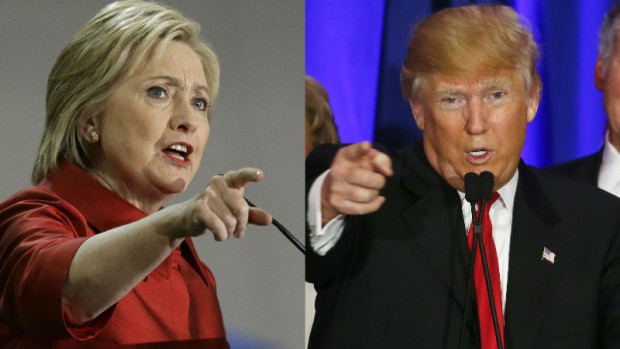
Democratic presidential candidate Hillary Clinton and Republican presidential candidate Donald Trump AP photos
WASHINGTON—Republican Donald Trump and Democrat Hillary Clinton are eyeing an opportunity to pull away from their rivals on Tuesday in multiple state contests across the country that could accelerate their march toward the general election.
Voters from Vermont to Colorado, Alaska to American Samoa and numerous states in between were heading to polling places and caucus sites on what is known as Super Tuesday, the busiest day of the 2016 primary campaign.
The contests come at a turbulent moment for Republicans as they grapple with the prospect of Trump becoming the party’s nominee.
His main rivals, Florida
Sen. Marco Rubio and Texas Sen. Ted Cruz, are engaged in a frantic effort to stop the billionaire real estate magnate—with Rubio in particular lobbing surprisingly personal attacks—but it was unclear whether they had made their move too late.
Tensions boiled over during Trump’s rally on Monday in Radford, Virginia, where he was repeatedly disrupted by demonstrators, including 20 or more chanting “Black lives matter.”
At another point, he asked a protester, “Are you from Mexico?” after he was interrupted during remarks about immigration. He ordered several people to be removed, then cast himself as a unifying political force.
“Believe it or not, we’re going to unify this country,” he said.
Focus on Trump
Like Trump, Clinton has won three of the four early voting contests, including a thrashing of rival Bernie Sanders in South Carolina on Saturday.
Her victory there was due to overwhelming support from black voters, putting her in position for a strong showing in several Southern states with large African-American electorates that vote on Tuesday.
Clinton has shed nearly all references to her Democratic opponent in recent days, choosing instead to focus on Trump. She is casting herself as a civil alternative to the insults and bullying that have consumed the Republican race.
Race to bitter end
“What we can’t let happen is the scapegoating, the flaming, the finger-pointing that is going on the Republican side,” she told voters gathered on Monday in Springfield, Massachusetts.
“It really undermines our fabric as a nation. So, I want to do everything I can in this campaign to set us on a different course,” she added.
Sanders, a self-described democratic socialist who has energized young voters with his call for a political revolution, was seeking to stay close to Clinton in the South and pick up victories in states including Minnesota and his home state of Vermont.
But Sanders faces tough questions about whether he can rally minorities that are core Democratic voters.
Still, Sanders has the resources to remain in the race through the last primaries in June, with his campaign announcing it had raised more than $41 million in February alone.
Democrats will vote in 11 states and American Samoa on Super Tuesday, with 865 delegates up for grabs. It will take 1,237 delegates to secure the nomination at the party’s national convention in July in Philadelphia.
Republicans will vote in 11 states, with 595 delegates at stake—nearly half the 1,237 delegates needed to gain the nomination at the party’s convention, also in July, in Cleveland.
Trump was seeking to sweep the South, which would be a massive blow for Cruz.
The Texas senator, a favorite of the region’s social conservatives and evangelical Christians, expected the South to be his firewall, but now is simply hoping to emerge with a victory in his home state.
Modest goal
Rubio’s goal on Super Tuesday is even more modest. He’s seeking to stay competitive in the delegate count and hopes to pull off a win in his home state of Florida on March 15.
The Florida senator has cast himself as the Republicans’ best chance to win in a general election and has received a flood of endorsements from party officials after other more mainstream candidates dropped out.
But Rubio has failed to win a state so far, raising questions about his strategy for topping Trump.
Extraordinary split
Republicans spent months largely letting Trump go unchallenged, wrongly assuming that his populist appeal with voters would fizzle. Now party leaders are divided between those who pledge to fall in line behind Trump if he wins their party’s nomination and others who insist they can never back him.
An Associated Press (AP) survey of Republican senators and governors across the country showed just under half of respondents would not commit to backing Trump if he’s the nominee. Their reluctance foreshadowed a potentially extraordinary split in the party this fall.
The worries among Republicans appeared to grow after Trump briefly refused to disavow former Ku Klux Klan leader David Duke during a television interview.
Trump said he had not understood the interviewer who first raised the question about Duke and other white supremacists, and he did later repudiate him.
Black voters
For Sanders to have any hope of overall success with black voters, who overwhelmingly supported President Barack Obama in 2008 and 2012, he’s going to have to not only win motivated young black voters, but persuade older voters who’ve supported the Clintons for years to defect to him.
“Bernie has been able to appeal to younger voters based on many of the issues he has raised in his platform,” said D’Andra Orey, a political science professor at Jackson State University in Mississippi.
But, Orey added, the question is whether older blacks believe Sanders “is a viable candidate.”
Clinton is hoping her popularity with older black voters pays dividends on Super Tuesday.
Black voters make up 15 percent of all voters in the Super Tuesday states, according to Pew Research Center, with African-American voters making up almost 1 in 3 voters in Georgia and Alabama.
Those voters helped Clinton win the South Carolina Democratic primary handily with 8 in 10 voting for her, and are expected to be difference-makers for Clinton throughout the South.